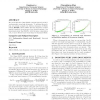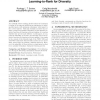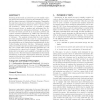SIGIR
2011
ACM
13 years 3 months ago
2011
ACM
Search engine switching is the voluntary transition between Web search engines. Engine switching can occur for a number of reasons, including user dissatisfaction with search resu...
SIGIR
2011
ACM
13 years 3 months ago
2011
ACM
SIGIR
2011
ACM
13 years 3 months ago
2011
ACM
We reveal that the Okapi BM25 retrieval function tends to overly penalize very long documents. To address this problem, we present a simple yet effective extension of BM25, namel...
SIGIR
2011
ACM
13 years 3 months ago
2011
ACM
SIGIR
2011
ACM
13 years 3 months ago
2011
ACM
Methods for fusing document lists that were retrieved in response to a query often use retrieval scores (or ranks) of documents in the lists. We present a novel probabilistic fusi...
SIGIR
2011
ACM
13 years 3 months ago
2011
ACM
Using relevance feedback can significantly improve (ad hoc) retrieval effectiveness. Yet, if little feedback is available, effectively exploiting it is a challenge. To that end,...
SIGIR
2011
ACM
13 years 3 months ago
2011
ACM
The assumptions underlying the Probability Ranking Principle (PRP) have led to a number of alternative approaches that cater or compensate for the PRP’s limitations. In this pos...
SIGIR
2011
ACM
13 years 3 months ago
2011
ACM
Searching is inherently an interactive process usually requiring numerous iterations of querying and assessing in order to find the desired amount of relevant information. Essent...
SIGIR
2011
ACM
13 years 3 months ago
2011
ACM
Traditional recommendation algorithms often select products with the highest predicted ratings to recommend. However, earlier research in economics and marketing indicates that a ...
SIGIR
2011
ACM
13 years 3 months ago
2011
ACM
The majority of the current information retrieval models weight the query concepts (e.g., terms or phrases) in an unsupervised manner, based solely on the collection statistics. I...




